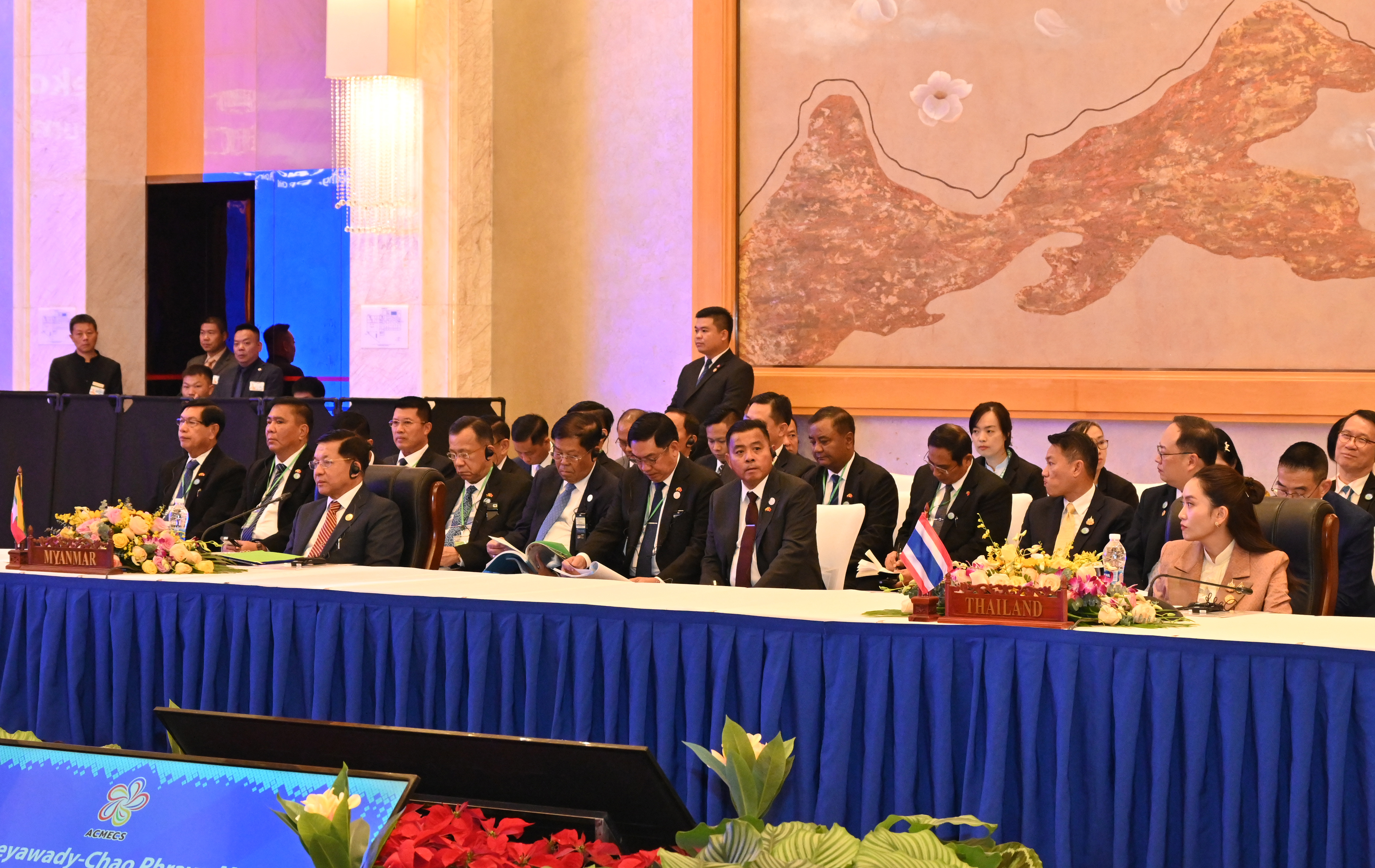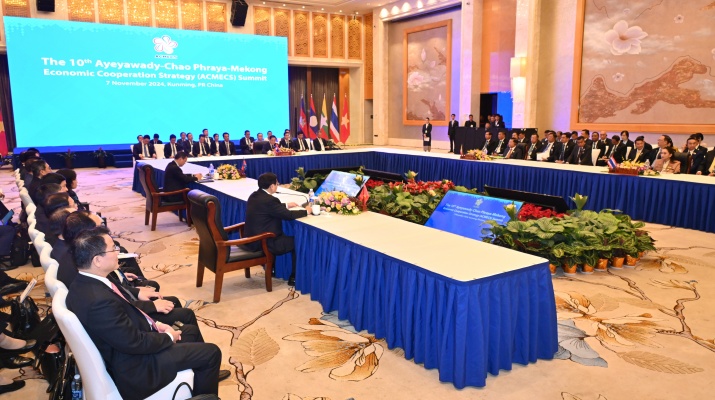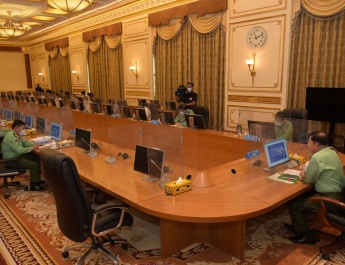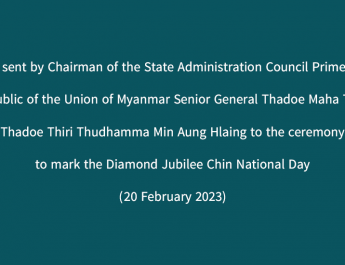NAY PYI TAW November 7
Chairman of the State Administration Council Prime Minister Senior General Min Aung Hlaing attended the 10th Ayeyawady- Chao Phraya-Mekong Economic Cooperation Strategy (ACMECS) at Wyndham Grand Hotel in Kunming of the People’s Republic of China this afternoon.
Also present at the meeting were Prime Minister of Cambodia H.E. Mr. Hun Manet, Prime Minister of Thailand H.E. Ms. Paetongtarn Shinawatra and party, Prime Minister of Vietnam H.E. Mr. Pham Minh Chich, Prime Minister of Laos H.E. Mr. Sonexay Siphandone, ministers, deputy ministers and senior officers from the member countries and officials.
First, on arrival at the meeting, the Senior General was welcomed by the Chairman of the Meeting Prime Minister of Laos.
The Senior General posed for documentary photos together with Prime Ministers of member countries.
The Prime Minister of Laos, the Chairman of the Meeting, delivered an opening address whereas the Cambodian Prime Minister gave a speech.
In his speech, the Senior General said the ACMECS cooperation which originated in Bagan of Myanmar in 2003 turned 21 years this year.
Since its establishment, the ACMECS is playing a key role in promotion of development of the region, narrowing of development gaps and enhancement of regional economic integration.
As the ACMECS is formed with five Mekong region countries, friendly relations of these five countries are based on long-lasting amicability and good neighborhood relations.
During the years of collaboration, these countries have been able to demonstrate the momentum of our joint efforts in relevant areas through various meetings and the ongoing work being carried out. Personally, the Senior General said that he recognizes Thailand’s leadership and the collective efforts of ACMECS member countries in successfully negotiating the establishment of the ACMECS Interim Secretariat (AIS) and signing a Memorandum of Understanding between ACMECS member countries and the Mekong Institute (MI).
The capabilities of the ACMECS Interim Secretariat have further enhanced the momentum of collaboration under the ACMECS framework, contributing significantly to regional integration efforts.
ACMECS, along with six joint development programs among the first-batch development partners, have been approved, which are greatly appreciated.
These joint development programs present excellent opportunities for closer cooperation in specific fields with our partners, as outlined in the programs.
They will further strengthen the ACMECS community, promoting comprehensive and resilient development.
The interconnected transportation network is a solid foundation for establishing the ACMECS region as a development hub.
It is important to develop an integrated transport system that connects all ACMECS countries seamlessly.
Myanmar aims to enhance infrastructure development to create better cross-border trade opportunities with ACMECS countries and to connect with regional economic corridors.
Efforts to expand energy transmission and power distribution networks are being made to bridge development gaps between urban and rural areas within the country, benefiting the entire ACMECS region.
In line with modern development needs, we emphasize the importance of advanced technology in promoting seamless regional connectivity.
It is necessary to enhance financial and trade cooperation, digital economy, and E-Governance networks among ACMECS countries with secure information and communication technologies.
We believe the main ACMECS program can serve as supplementary support in achieving development goals and targets.

Trade and investment are primary drivers for the ACMECS economy, significantly impacting our countries’ GDP, inflation rates, economic growth rates, employment, and social wellbeing.
By simplifying and reinforcing trade and investment regulations, the economic integration and living standards within the region will be notably improved.
We urge ACMECS countries to strengthen collaboration to enhance regional economic integration.
Myanmar invites development partners of ACMECS member countries to invest and trade.
Agriculture, the main food production source in the ACMECS region, including Myanmar, is also a crucial livelihood for rural communities, representing the majority of the population in the ACMECS area.
Additionally, agriculture plays a role in poverty reduction and reducing development disparities in the region.
We encourage private sector entities within ACMECS countries, especially small and medium enterprises and startups, to participate in modern economic programs under the ACMECS framework.
Myanmar is working to promote economic stability and increase employment opportunities nationwide through private sector-led development strategies.
Tourism development is supporting regional income flows, improving local people’s livelihoods, health care, and education in tourism areas.
Tourism is also a way to develop remote areas with limited employment opportunities, addressing development needs and providing job opportunities in those regions.
He urged ACMECS countries to foster socio-cultural interactions through tourism development initiatives and to work towards building a peaceful, mutually beneficial ACMECS organization by implementing the “Five Countries, One Destination” program that we have collectively agreed upon.
As Myanmar now assumes the chairmanship of ACMECS, it is eager to collaborate with fellow member countries to drive the comprehensive and sustainable development of the ACMECS region.
As Myanmar continues to prioritize cooperation with its neighboring countries in the Mekong subregion, it remains committed to actively collaborating within the ACMECS framework, grounded in the long-standing friendships established among member countries.
Myanmar will uphold the principles of good neighborliness, mutual understanding, respect, and the sharing of benefits.
The Prime Ministers of Thailand, Vietnam, and Laos then delivered speeches, officially recognizing New Zealand as a second-tier ACMECS development partner.
During the 10th Ayeyawady-Chao Phraya-Mekong Economic Cooperation Strategy (ACMECS) Summit, the “Vientiane Declaration” was adopted, and the “Concept Paper on Water Resources Cooperation in the Mekong Region” was introduced as a key follow-up to the ACMECS master plan.
After that, the Prime Minister of Laos handed over the role of ACMECS alternate chairman to the Chairman of the State Administration Council, Prime Minister Senior General Min Aung Hlaing, and delivered a speech.
Following that, the Chairman of the State Administration Council, the Prime Minister expressed Myanmar will make dedicated efforts to develop key development strategies during its tenure as chair of ACMECS, while continuing the progress of previous initiatives, ensuring that all ACMECS member countries can benefit from the regional development programs.
Myanmar will continue its efforts to advance ACMECS cooperation, working towards a fully integrated and developed ACMECS region, building on the path laid by previous chairmen.
As the new chairman, he expressed his hope for the continued vision, support, and cooperation of all member countries to overcome challenges and successfully achieve the goals of ACMECS cooperation.
He also looked forward to the opportunity to meet with representatives of the member countries at the next ACMECS summit, which will be hosted in Myanmar.
With that, the meeting was adjourned.
The 10th Ayeyawady – Chao Phraya-Mekong Economic Cooperation Strategy (ACMECS) is being held with the goal of enhancing the competitiveness of Mekong countries, particularly in border areas, and making development more productive.
It aims to support the relocation of agricultural and manufacturing activities to regions with greater opportunities, create new job prospects, reduce income disparities among member countries, and promote peace, stability, equality, and prosperity, ultimately fostering sustainable and inclusive development for all.




